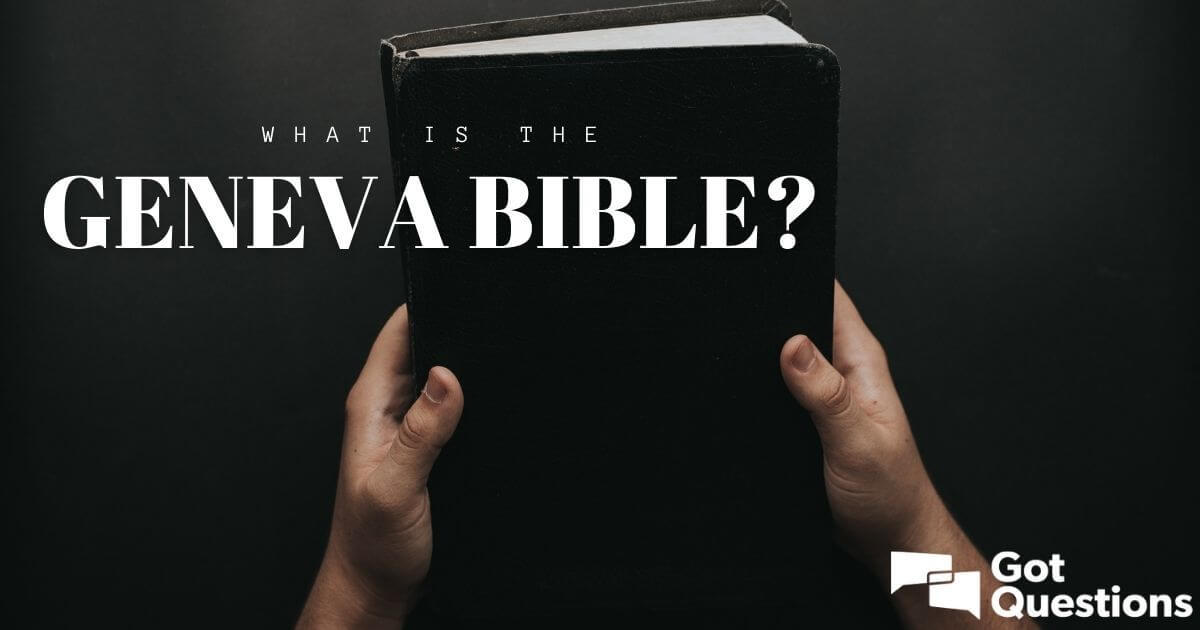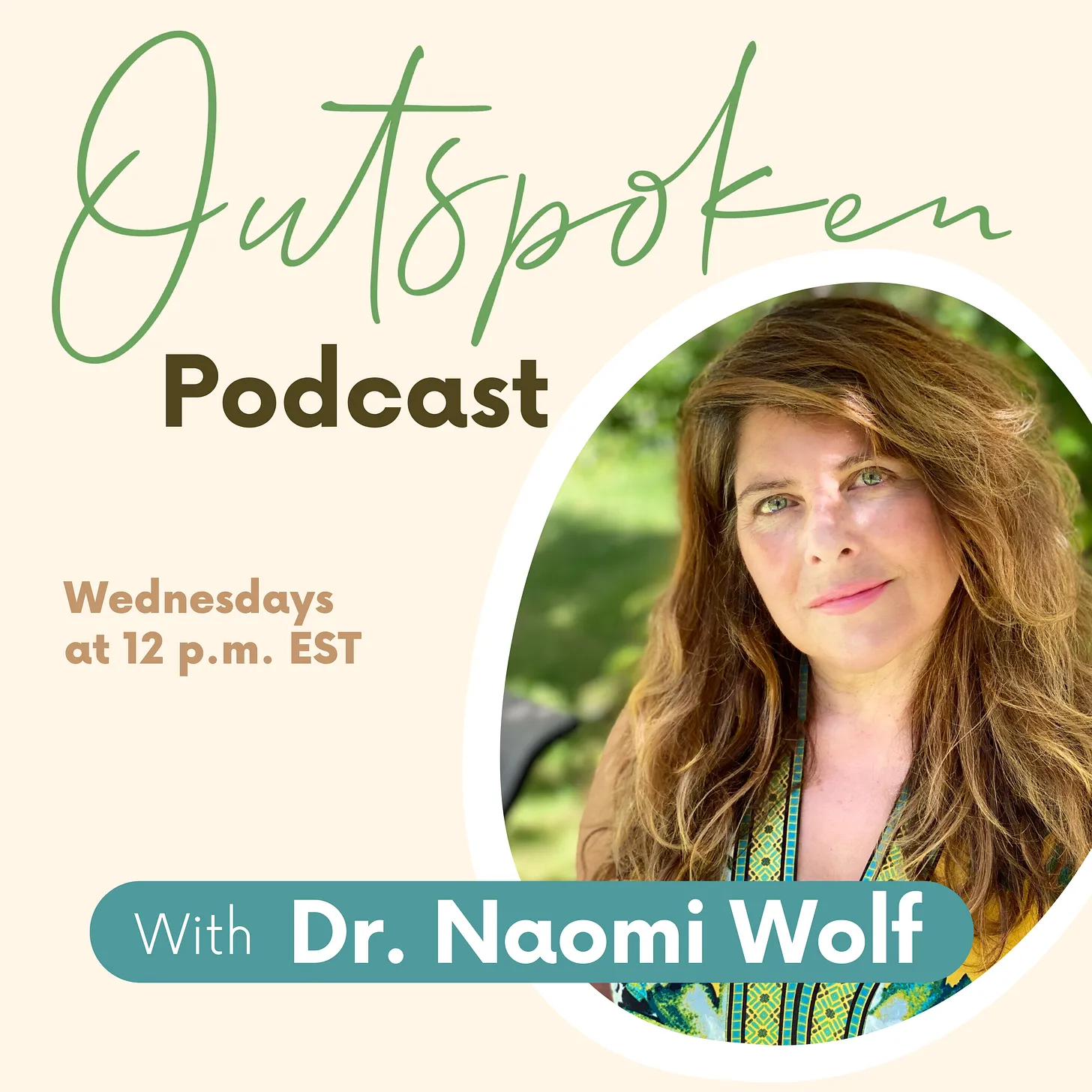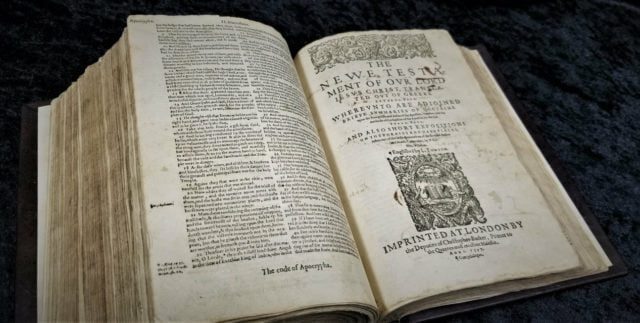
You have to listen to the second reading from the 1560 Geneva Bible by Naomi Wolf (chapters 4-6 of the book of Genesis). By the end of it, Noah, his wife, their sons, and their sons’ wives, are safely on board and all have provisions.
Mostly, I am thrown by the amazing telling of the story. Dr. Wolf was inspired to read the 1560 Geneva Bible because it is the rebel’s bible. The Puritans fled England in the 1500s to avoid persecution (to … Geneva!). While there, they put together an English translation of the bible, direct from the Hebrew and the Greek. It’s a cool bible. It was printed with artwork, maps, and annotations.
The bible was a huge hit in England. It influenced the literary greats; Shakespeare quoted this version hundreds in his plays (1300 biblical references in all). King James thought enough of it (its power, beauty, and the threat to state religion) that he commissioned an Authorized Version of the Bible that was a little safer, in his mind. It inspired the Pilgrims and the Puritans to deploy to the New World to build a Shining City on a Hill. It was the preferred version of America’s Founding Fathers. It is a Bible of God in direct relationship with his people, told beautifully (“Then God said, Let the earth bud forth the bud of the herb, that seedeth seed, the fruitful tree, which beareth fruit according to his kind, which hath his seed in itself upon the earth: and it was so.”)
But when Naomi started reading it, what she found blew her away. She found a loving God, who cares deeply for His creation and especially the men and women He made in “Our” image and likeness. We keep turning away, and he, lovingly, is there. It is a love story, and an intimate one.
I never felt compelled by the Hebrew Bible before, when reading other translations; it was hard to feel connected to the Being that seemed Quixotic, distant and even irrational. But in this version, the Geneva Bible, we have a God who longs for a communion with humans, and we have a much less lonely, much less punitive set of circumstances in which human development is meant to unfold. In later translations, God is made much more abstract, and much more rigidly judgmental; and priests and religious institutions are foregrounded. In this early version (and in the Hebrew), it is a heart-wrenching, challenging love story between the Lord and his creation, human beings. A very very serious relationship; but very very intimate and tender.
Wolf reads Hebrew, and so she can see exactly what was translated. She wanted to compare it to a contemporary translation. For this, she picked The Jerusalem Bible. I happen to know this version. I was given it as a college graduation present. I asked a veteran theology professor which version I should get, and this was his recommendation. I have read it more than once.
From the very beginning, the 1560 Geneva Bible is loving and beckoning. While pre-creation in the Jerusalem Bible was a “formless void,” the 1560 Geneva Bible (and/or the Hebrew) described it as “astonishingly empty”. On the second day, The Jerusalem Bible puts God in a vault; the Hebrew has him in the sky. Instead of a cold, distant, and punishing God in the story of the great flood, God faces a very bittersweet moment in flooding out his creation. He is very tender in making sure all of the people important to Noah get on the ark, and that they, and all of the animals are provided for.
Dr. Wolf reads both 16th century English and modern Hebrew, so it seems very much that she was made for a time such as this. I really think that this is momentous and will be recognized as a significant moment in Judeo-Christianity. A lovely, winsome, truth-seeking woman is reading the bible and translating it occasionally, live and in real time. It brings her to tears. There is nothing cold or distant about it. This is the story of a loving God, who longs to be in relationship with His creation; as told by a woman.
I think of all of the people who have been turned off from religion and want to say, “Sister A: God is not just a distant force that created the universe and left the scene. You’ve got to read this.” “Sister S: I can see why you were put off by the Bible. You were right. God is kind of off-putting in the versions that we were shown. You are going to feel like all is right with the universe and everything finally makes sense when you hear this.” And on and on, through all of my friends that have turned away, through all of the letters of the alphabet.
And for my Christian friends, too. “Brother Troy: Wow, you think that you love the Word now? Wait until you hear this!”
Just like manna for the Hebrews in the desert: as the world gets crazier, Jehovah Jireh: The Lord provides. He is giving us the bread of life through the voice of this beautiful and brave woman. Please, come and eat with us!
For more readings, go to her substack (also linked below).













































